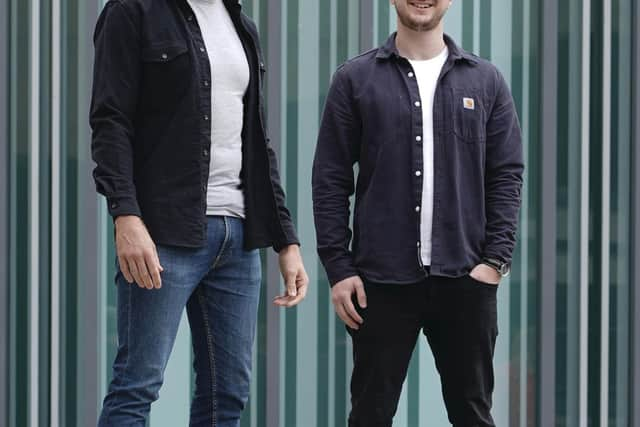The early-stage Scottish fintechs aiding the post-Covid recovery for the economy and wider society


Fintech has a central role to play, connecting businesses and customers in a financial way that allows products and services to be better served and used. And in a post-pandemic world, the use of fintechs has never been more appropriate.
In turn this has an impact on the wider economy, allowing growth to re-start in a meaningful manner while increasing the ability of those at all levels of society to access the benefits, jobs and services they need to improve their quality of life.
Advertisement
Hide AdAdvertisement
Hide AdAnd the future looks bright: in September, Nadine Dorries, the UK’s new secretary of state for Digital, Culture, Media and Sport, said Scotland’s tech sector is growing rapidly.


Figures show tech jobs in Glasgow and Edinburgh have increased by more than 25 per cent in the past two years – well above the UK’s average. There are now 135,000 people employed by Scottish tech start-ups and scale-ups, the highest number outside London and the south-east of England.
Here we present some of the Scottish fintechs leading the way to recovery in a post-pandemic world.
Zumo
Cryptocurrency has become more important and attractive during the uncertainty which swept the globe during the pandemic, according to Nick Jones, chief executive and co-founder of Zumo, which aims to increase the accessibility of “smart money”.


And he says the wider fintech community was also able to adapt and stay strong during the restrictions, allowing them to build faster as society re-opens.
Jones says: “We were already functioning as a remote workforce, the fintech sector was naturally more resilient to the impact of lockdown compared to most industries, and the pandemic coincided with unprecedented global interest in cryptocurrencies.
“The result is that we grew a lot during the pandemic. More people have been turning to crypto as an investment option for the savings they accumulated during lockdown, and many younger generations see crypto as an alternative to the traditional banking system that has never really served them.
“During the last 12 months, we also ran two incredibly successful referral programmes to help people to get comfortable with crypto and try it out with no initial financial investment. The latest has just ended, helping us bring 12,000 new people to crypto.”
Advertisement
Hide AdAdvertisement
Hide AdJones says the Scottish start-up and fintech sectors have been very resilient during the pandemic, and play an important role in Scotland’s wider economy.
He adds: “As for crypto more specifically, the fact that it’s secure and accessible to everyone means it can become even more important and desirable during times of uncertainty.
“This is especially true for the unbanked and people who feel let down by traditional finance.”
Jones is optimistic about his Edinburgh firm’s prospects. “With a global outlook, and breadth of product offering covering both mainstream consumer and business needs, we believe ourselves well placed to capitalise on unprecedented and growing consumer and institutional interest in digital assets and decentralised applications,” he says.
Women’s Coin
Christine Bamford launched Women’s Coin in 2017 as the first global women’s blockchain crypto currency based on social value.
Half of its pre-tax profits are donated to humanitarian work to support the UN’s sustainable development goal around women’s equality, while its micro-finance initiative enables women to set up in business, with a pilot project launched in Kenya. It also aims to help the 1.7 billion of the world’s population without access to a bank account.
Bamford – a visiting professor at Edinburgh Napier and Northampton universities – has described her mission as redefining charitable giving and impact investment, using blockchain and tokenisation to ensure transparent, secure donations reach the point of need.
A combination of a digital identity, smart contract and business training will open up lines of credit for 12 million or more women-run businesses underserved or unserved by financial institutions. This will start a virtual cycle of investment and reinvestment that will improve the lives of women
SageCity
Advertisement
Hide AdAdvertisement
Hide Ad“We’re connecting innovative entrepreneurs with the tools and resources they need to make their business thrive,” proclaims blockchain solutions company SageCity.
Based in Edinburgh, the firm helps design and develop solutions for process and infrastructure challenges that companies
face.
SageCity utilises sidechain technology – extensions from the SageCity platform that can handle a specific and dedicated function and allow companies to own their infrastructure.
SageCity began in August 2018 when co-founders Adam Greenberg and Tom Sichel noticed a rising number of start-ups were pushing the boundaries of innovation but being limited by current options.
They began designing the SageCity blockchain, a smart contracts enabled platform which focused on 2nd layer protocols, primarily sidechains, to empower enterprises to drive innovation.
Striver
Making things simple is the key to growing the economy in a post pandemic world, according to Brian McCrindle, co-founder of Striver, which aims to help micro-businesses access the tools, resources and advice they need to bounce back stronger.
He says Striver helps businesses by “making sure they are modern and technologically savvy and they have the tools they need, and understand how to make them work in the best possible way”.
He points to service provision from microbusinesses such as nail technicians, hairdressers and dogwalkers which he says can be digitised: “It is their time that generates their income and it is their time that becomes squeezed if they are not technologically savvy enough. If we can simplify all that, we can give them time back.”
Advertisement
Hide AdAdvertisement
Hide AdHe says his Borders-based company provides a single place for components which already exist such as payment gateways, booking tools, website building and social media dissemination.
McCrindle says: “One of Striver’s missions is to help businesses
to become stronger because everyone will benefit – businesses, consumers, the economy, taxpayers.”
Nude
Home ownership has long been seen as an aspiration which can help not only the mortgage-holder, but also wider society.
And for Crawford Tayler, chief executive of Nude, that tenure of property could be available to a wider group – with a little help.
He says: “Nude is a savings and investments platform to encourage people to get good money habits: ideally not to over-borrow, to think about their next purchase and ask if they really need it and to say, ‘Maybe if I put that by I could save for a deposit and buy a home’.
“If you buy a home there is a greater sense of financial well-being, a greater sense of well-being generally and you are building an asset for
the future. That gives people the stability to deal with the ups and downs of life – they are maybe not taking out too much credit and they have got some savings behind them for a rainy day.
Advertisement
Hide AdAdvertisement
Hide Ad“Financial stability is fundamental to a strong economy and what better way than having that strength coming from the people in the economy?”
Tayler says Nude’s investors were “very supportive” during the pandemic and allowed them to deliver “everything we set out to” amid the restrictions.
Things are getting better now but not everything is the same as before – “a number of the team meet once a week at a co-working space, but we still, in the main, work from home.”
However, the Glasgow outfit is full of “big plans”.
“We’re planning to launch many more features over the coming months, raise more investment to grow faster, and apply for a banking licence to provide not just savings accounts for our customers’ home deposit, but the mortgage as well."
HomePointr
HomePointr is Scotland’s first matching platform for affordable housing. It gives housing providers a platform for connecting with applicants and referral agencies, lowering their technology development costs and improving their operating efficiency to save them time and money.
They have designed a system for dealing with the day-to-day process of managing housing: waiting lists, marketing, filling voids, communicating with applicants, minimising the risk of tenancy offer refusal and losses, and maximising rental income.
HomePointr and fellow Edinburgh fintech Inbest are collaborating in the development of an application to support vulnerable customers to find affordable houses, and improve their financial wellness and resilience.
At the height of the lockdown, in April 2020, HomePointr announced that during the crisis every housing provider in Scotland could use their Affordable Housing Referral software for free.
Advertisement
Hide AdAdvertisement
Hide AdSince then, they have developed a digital wellness platform to promoting physical and mental health, and the social and financial wellbeing of employees.
Their mission statement says they “know that matching the right property to the right tenant, in a cost effective manner can be a challenge”.
Adding that their system allows “applicants to search, find, and secure suitable affordable homes” while social landlords are helped in the reduction of “housing offer rejection and administrative burden”.
MoneyMatIX
Edinburgh-based MoneyMatiX is a “personal development company that helps families understand money and acquire life skills to maximise the potential and income of adults so that they can model healthy habits for their children”.
It was founded by Tynah Matembe, who moved to and started a family in the UK but struggled to reconcile the attitudes of money from his cash-based Uganda home with Scotland’s mostly cashless, credit-ready economy.
MoneyMatiX also works with firms to improve financial wellbeing in the workplace by providing staff with financial capability tools.
The company says: “Our mission is to turn adults into financial role models for the next generation which will ensure a healthy financial future for all.”
Inbest
Inbest, the data analytics platform driving social inclusion, has been working hard during the pandemic.
Advertisement
Hide AdAdvertisement
Hide AdEarlier this year it opened its benefits calculator free of charge to support welfare advisers, affordable lenders and money charities.
The Edinburgh fintech develops data and digital money management solutions that meet the specific needs of financially vulnerable people. For example, helping them to access their benefits, understand the level of support that disabled people need, or find the best debt solutions.
In May, Glasgow fintech Soar integrated Inbest’s benefits calculator into its banking platform to compare the actual benefits that customers receive with the benefits they are entitled to.
Manu Peleteiro, chief executive of Inbest, says: “We believe that partnering with companies that offer complementary financial services is the most efficient way to reach people that are missing out
on their benefits.”
Gigged.AI
Gigged.AI began life just as the world was descending into the fear and confusion of lockdown.
March 2020 might seem a strange time to start a business, but Rich Wilson, co-founder and chief executive foresaw a demand for tech skills and remote working.
In a sign they were on the right track, the Glasgow firm received funding that year from Innovate UK, going on to receive the top rating from the innovation agency against more than 1,500 other completed projects.
Wilson says: “It was very difficult to access funding in the early days of the pandemic but it gave us time to build a strong business plan and gain early traction.”
Advertisement
Hide AdAdvertisement
Hide AdNow, Gigged.AI is building back strongly after the lifting of restrictions. Wilson says: “There are vibrant new start-ups and also established companies who are building new digital products, which is creating demand for staff and boosting the economy.”
And he says: “Our business uses fintech and artificial intelligence to help UK-based companies source and onboard on-demand tech talent. This helps those companies create new digital products to ultimately drive revenue.
We are also helping the growing freelance community in the UK find high quality projects.”
He adds: “We have just closed a seed funding round so we are hiring teams which will allow our platform to grow exponentially over the next 12 months. We have also just been accepted to the University of Edinburgh AI Accelerator which will allow us to further develop our Conversation Artificial Intelligence product that will allow us to grow further in Europe and North America.”
This article first appeared in the October 2021 edition of The Scotsman’s Fintech Focus supplement. A digital version can be viewed here.